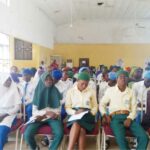It is now eight months since members of the Academic Staff Union of Universities [ASUU] commenced a strike, which began as a warning strike on March 9, 2020.
Since then, needless twists and turns and obdurate stance of both sides have elevated it into a vain contest of egos. Four weeks since Education Minister Malam Adamu Adamu announced on October 2 that all schools in the country were safe for full re-opening from October 12, public universities in Nigeria are still closed with no date for reopening.
- #EndSARS: We’re Still Quantifying Our Losses – BRT Operators
- Mallam Sidi: Inside The Rehab Of Repentant Boko Haram Members
ASUU President Professor Biodun Ogunyemi said the strike was declared in order to compel government to implement the outstanding agreements and resolutions of the Memorandum of Understanding [MoU] it signed with ASUU in 2009, 2013 and 2017 as well as the Memorandum of Action [MoA] of 2019. Except for the Nigerian University Pension Management Company [NUPEMCO] Limited that successfully took off, government has failed to honour all other aspects of the 2019 MoA.
Other unfulfilled parts of the agreements include part payment of outstanding arrears of Earned Academic Allowances (EAAs) as well as mainstreaming further payments into annual budgets beginning from 2019. The agreement to send visitation panels to all federal universities, tentatively agreed to commence in March last year, is also outstanding. The hot dispute that later ensued over enrolment of ASUU members on the Integrated Payroll and Personnel Information System (IPPIS) later came to overshadow all other aspects of the FG-ASUU dispute.
During his 2020 budget presentation to the National Assembly in October last year, President Muhammadu Buhari said salary should not be paid to federal workers who failed to enrol on IPPIS by the end of October 2019. He repeated the same directive in his 2021 budget speech on October 8, 2020. ASUU has consistently argued that IPPIS does not make provisions for sabbatical leave, visiting appointments, arrears of promotion and responsibility allowances. It is now one year since the bickering over IPPIS implementation started, with no end in sight.
Last month, Senate President Ahmad Lawan invited ASUU leaders to a meeting, which paved the way for the government and ASUU to resume negotiations. After a meeting held on October 13, this year, Minister of Labour and Employment Chris Ngige said government agreed to consider the University Transparency Accountability Solution (UTAS) platform that ASUU presented. He said the software would be subjected to integrity tests. After another meeting on October 16, Ngige told ASUU leaders, among other offers, that N30 billion will be released on or before November 6 as part payment of EAAs. He said the remaining N10 billion would be paid in two equal tranches in May 2021 and February 2022. However, all payments including ASUU members’ withheld salaries would be paid through the IPPIS platform. ASUU rejected this offer and the meeting ended in deadlock. Another meeting held on October 28 also ended in deadlock. Mode of payment of withheld salaries and EAAs remain the most contentious matters about which neither federal government nor ASUU is shifting ground.
Given its promotion of high ethical principles in Nigerian society, ASUU should not reject any scheme that seeks to promote accountability in the payment of workers’ wages. Besides, employees should not dictate financial policies to their employer. University autonomy is not an adequate argument against IPPIS because ASUU does not generate revenues for paying its members’ salaries. We condemn government’s inexcusable culture of consistent default in implementing agreements. Yet, ASUU has lost a lot of public sympathy due to its incessant strikes over the years.
The ongoing ASUU strike was a factor in the large turnout of youths in the #EndSARS street protests. Students in public universities, their parents/guardians and Nigeria’s economy are the worst victims each time ASUU goes on strike. These strikes have contributed to the poor quality of Nigerian graduates over the years. ASUU should learn to utilise other options in industrial disputes, such as seeking redress at the National Industrial Court or taking its case to the National Assembly, instead of incessantly shutting down the university system.
Both sides should quit their ego trips and meet on middle ground. We urge ASUU to accept the period and figures proposed by the federal government for settling its entitlements. It is realistic given the shape of the economy occasioned by COVID-19 pandemic and lockdown. We also urge the federal government to adopt UTAS as long as it passes all integrity tests. During the transition period to the UTAS, ASUU members should be paid through the existing pre-ASUU strike platform.
This undue clash of egos has cost varsity education in Nigeria dearly. Most of this year is already lost to the new pandemic and lockdown. Nigeria would be paying a costly price for generations to come if this impasse is not immediately resolved. Education is one of the sectors worst hit by the COVID-19 pandemic. Worse still, Nigeria had already missed out in nearly all global education targets including Education for All. We, therefore, urge President Buhari, as father to all and as Visitor to all federal universities, to break this ego contest and ensure a quick resolution of this unnecessary deadlock.

 Join Daily Trust WhatsApp Community For Quick Access To News and Happenings Around You.
Join Daily Trust WhatsApp Community For Quick Access To News and Happenings Around You.


